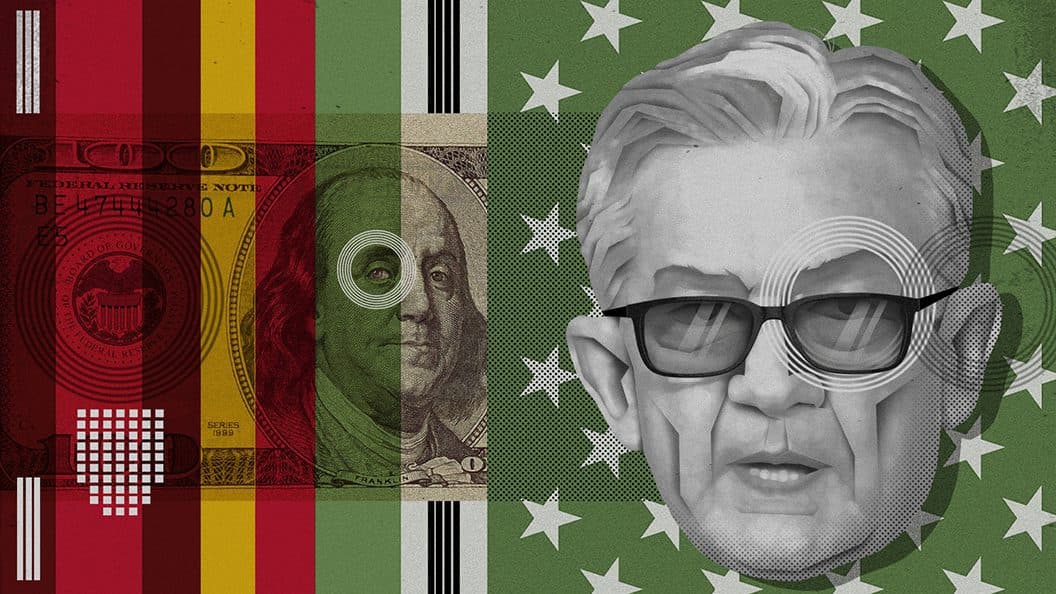Powell: We Can Retire the Term ‘Transitory Inflation’
The Federal Reserve is considering whether to wrap up the taper of asset purchases months sooner than previously planned.

Jerome Powell, chairman, Federal Reserve; blockworks exclusive art by Axel Rangel
- Managing inflation expectations has proved challenging, and prices may remain elevated, even as the rate of inflation recedes
- Powell faced tough questioning from some senators as the Fed considers whether to accelerate plans to taper its regular asset purchases
The Federal Reserve has a different definition of the term ‘transitory inflation’ than most Americans, Chairman Jerome Powell said Tuesday, suggesting that the word be “retired.”
Powell appeared alongside Treasury Secretary Janet Yellen before the Senate banking, housing and urban affairs committee about the Coronavirus Aid, Relief and Economic Security (CARES) Act Tuesday for the first of two days of testimony.
Lawmakers had a series of tough questions for the two officials, ranging from stablecoin regulation to bond tapering and inflation. Senator Pat Toomey, a Republican from Pennsylvania, expressed frustration with Powell’s long-time insistence that inflation is “transitory.”
“Everything is transitory. Life is transitory,” the senator said.
Powell responded by redefining the word that has ruled headlines for the better part of the year.
Most consider ‘transitory,’ in the context of inflation, to mean that higher prices will be short-lived, Powell said, but the Fed believes that ‘transitory’ means that inflation will not lead to permanent economic damage. It is a good time “to retire” the term, Powell said.
Nancy Davis, founder of Quadratic, believes Powell’s comments are overdue.
“He’s late to remove the word ‘transitory’ in my opinion. I think it has been very clear for some time now that inflation is impacting the real economy,” she said Tuesday during a question and answer session with Bloomberg’s TOPlive.
“In terms of its impact on markets, I think it means that the Fed is going to continue tapering and removing liquidity from financial markets. That means the potential for additional market volatility.”
Powell’s comments come after he insisted for months that higher prices would be fleeting.
“Policymakers and analysts generally believe that as long as longer term inflation expectations remain anchored, policy can and should look through temporary swings in inflation,” Powell said in August during his Jackson Hole policy forum address.
Prices have risen 4.4% year-over-year since September. The Fed’s inflation target is 2% annually. Powell has since insisted that higher inflation is due to supply chain issues and bottlenecks as a result of the pandemic.
When pressured on Tuesday to explain how experts’ inflationary predictions were so off, Powell again pointed to ‘unpredictable’ supply chain issues.
“We didn’t predict the supply side problems, and those are really [non-]linear and hard to predict,” Powell said. “That’s really what we missed, and that’s why professional forecasters had much lower expectations for inflation.”
If inflation pressures persist, Powell said, it may be appropriate to hasten the pace of asset purchase tapering, which the Fed announced would begin this month.
“It is therefore appropriate in my view to consider wrapping up the taper of our asset purchases, which we actually announced at our November meeting, perhaps a few months sooner,” he said Tuesday.
The Fed’s next meeting is scheduled for December 14 and 15. President Biden recently reappointed Powell to Chair the Fed Board of Governors for a further four years. He still faces confirmation in the Senate.
Get the day’s top crypto news and insights delivered to your inbox every evening. Subscribe to Blockworks’ free newsletter now.






